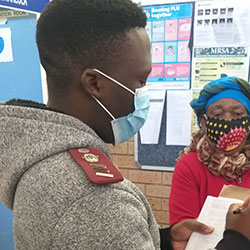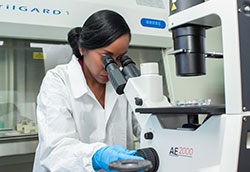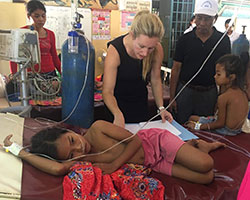Top global health research stories of 2020 from Fogarty and NIH
December 3, 2020




Photo credits:
Courtesy of Themba Nxumalo
iStock
Courtesy of University of the West Indies
Courtesy of Tyler Mahal
During an unprecedented year of challenges for the global health research community, as the COVID-19 pandemic circled the globe, Fogarty and its extensive network of international partners responded to the health crisis, and continued to build and leverage global partnerships, and train the next generation of global health leaders. This year's top selections from readers and editors of the Fogarty International Center's
Global Health Matters newsletter demonstrate the global health research community's dedication, flexibility and resilience.
As a result of the COVID-19 global pandemic, Fogarty and NIH grantees, trainees and fellows are helping lead and support
COVID-19 response efforts in low-resource countries and regions, including confronting
ethical issues of conducting research during a pandemic, capturing
'lived experiences' of frontline health care workers, and
leveraging infectious disease training to support the COVID-19 response.
Fogarty Director Dr. Roger I. Glass explored ways to make progress on the difficult but vital goals of
decolonizing and democratizing global health.
The NIH Common Fund
launched the $58M Harnessing Data Science for Health Discovery and Innovation in Africa (DS-I Africa) program, along with a
virtual symposium and networking platform to support data science researchers on the African continent. Fogarty’s director made the case for why now is the time to
invest in this critical area of research.
Fogarty and NIH renewed their commitment to
end racism and promote equality by contributing to meaningful solutions, individually and through collective efforts.
NIH closed loopholes governing grantees to continue to
reduce sexual harassment in science. Fogarty awarded
grant supplements so low- and middle-income country institutions can shore up policies, conduct training and create awareness of sexual harassment and processes to report it.
Research supported by Fogarty and NIH partners on
mobile health technology and outcomes in low- and middle-income countries has catalyzed innovation.
Fogarty examined
pain relief research priorities and treatment options in low-resource settings.
To encourage emerging global leaders, Fogarty allocated
$4 million to support early-career scientists.
Former Fogarty trainee Dr. Lloyd Mulenga discussed combining roles as a
physician, scientist and policymaker in Zambia, and his hopes for the next generation of young scientists.
Early-career investigators supported through
Fogarty's Global Health Fellows and Scholars have continued - to the fullest extent possible - their collaborative, mentored research training opportunities, receiving
encouragement from NIH Director Dr. Francis S. Collins during the first-ever virtual orientation. Profiles highlighted former fellows' efforts to evaluate a
novel malaria detection device in Cameroon, and to help
Cambodia respond to COVID.
More Information
To view Adobe PDF files,
download current, free accessible plug-ins from Adobe's website.